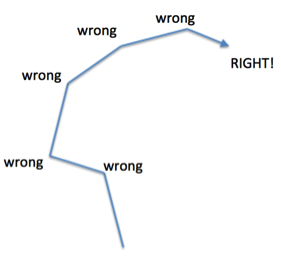Thinking back over the past four plus years working in ad tech there has been a lot of change. Companies have launched and folded, industries have shifted, and business opportunities have come and gone. Amid this rapidly shifting landscape, I often ask myself “was I right”?
Was my prediction I made in 2009 about the future of agencies correct? Was the prediction I made in the beginning of the year about our business strategy right? Was I right about what was going to happen to viewability and verification companies? Was I right about who was going to get acquired? Etc. Etc.
When history proves me right, I feel great. Inside my mind I confidently proclaim, “I called it! I am the Nostradamus of ad tech!”
When I’m wrong, I usually find something to blame: “Well, I should have been right if it weren’t for x, y, z.”
This week I realized something important: it really doesn’t matter if my past predictions were right or wrong.
It’s human to want to know who was right – who had excellent foresight and who was wrong and myopic, however analyzing the accuracy of predictions that were made in the past is a truly useless endeavor.
Here’s why:
Predictions about the future always have an expiration date. That date is when you learn something new that’s relevant to your prediction. As the future reveals itself, and more information becomes available, predictions should be adjusted. A tweak here and there to make sure your strategy stays on course.
The person who makes a single guess about the future and keeps the same strategy (hoping to eventually declare they were “right”) will always lose compared to the person who guesses, modifies, tweaks, and then guesses again.
An illustration of a winning path:
No one is omniscient – we learn every day. Being wrong in the past is fine because it was an opinion that was based on incomplete information. Based on the information you had at the time, you probably made the right decision. Now that you have more information – you have a better (but likely still incomplete) view.
Obsessing over who was right or who was wrong in the past serves only as a distraction – and wastes precious time that could be used to figure out what’s going to happen next.
